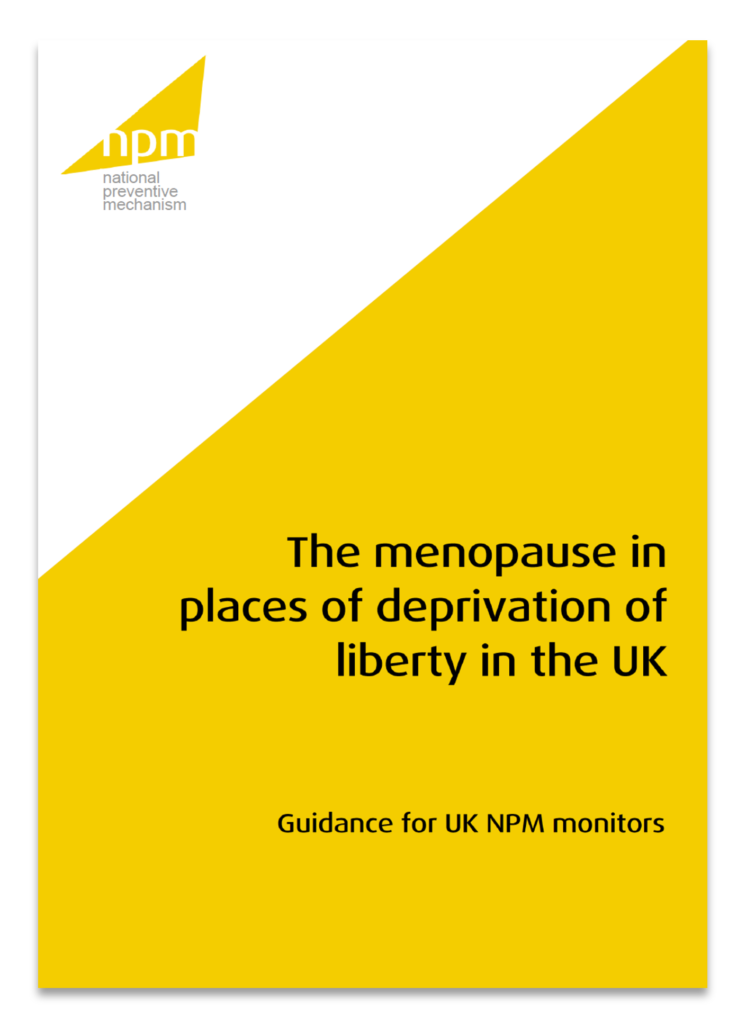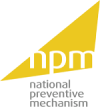Blog: World Menopause Day – prioritising women’s health in detention
With the launch of the NPM guidance for monitors on menopause in detention, Independent Custody Visiting Scheme Manager Claire Taylor reflects on the project’s origins in Sussex

In recognition of World Menopause Day 2024, I am pleased to share the story of the Menopause in Detention Toolkit launched today by the UK NPM, and developed through the collective efforts of numerous staff and volunteers who contribute to the National Preventive Mechanism mandate to prevent torture and cruel, inhuman and degrading treatment of people deprived of their liberty.
Independent Custody Visitors (ICVs) make unannounced visits to police custody to check on the rights, entitlements and welfare of detainees. A few years ago, my Sussex ICV team and I noticed there were no clear, consistent policies across police forces in relation to considerations for detainees experiencing the menopause, or how forces actively identify vulnerabilities linked to menopausal symptoms. It was vital this was addressed urgently, as peri-menopausal, menopausal and post-menopausal symptoms can sometimes be debilitating, potentially leading to unseen vulnerabilities. In detention settings, a lack of proper awareness can mean people going through menopause may be treated unfavourably.
With that in mind, our team set about to address this policy gap to ensure that those who are experiencing the menopause are offered the right support, are treated humanely, and that any potential vulnerabilities are identified during the criminal justice process.
After extensive research into what additional facilities and processes could be offered, the Sussex ICV scheme consulted with the College of Policing and worked with the Independent Custody Visiting Association (ICVA) to compile recommendations nationally for all women in custody aged 40-55 years old. The recommendations included:
- the ability for those held in police custody to self-refer to an on-site Healthcare Practitioner for a health screening;
- a recommendation that Forces should devise care plans to meet the individual needs of a detainee in the menopausal transition;
- Menopause specific hygiene packs and replacement clothing as well as consideration of interview times.
My team and I put forward these recommendations to Sussex Police & Crime Commissioner Katy Bourne, who spearheaded a project that established a referral pathway to provide support for those experiencing menopause whilst in police custody in England and Wales. This referral pathway will mean that all women entering police custody aged 40 and over are asked at the point of booking into custody if they would like to speak to a healthcare professional about perimenopause, menopause, or post-menopause symptoms. If the detainee is open to this support, a healthcare professional will discuss their individual needs for a care plan to be produced for their time in police custody.
Following the success of the recommendations and toolkit the authorised professional practice for policing (APP), issued by The College of Policing, now states all forces across England and Wales should have the menopause referral pathway in their custody centres. The APP must be adhered to by all forces and sets out mandatory policies.
The Sussex ICV team has led on this workstream, and continue to work with ICVA, the National Police Chiefs’ Council, healthcare professionals, regional representatives, and stakeholders. My team also presented the delivery plan at a Parliament Round Table event on Menopause.
In April 2023 I approached the UK National Preventive Mechanism (UK NPM) for a discussion of how the work undertaken on police custody could best be shared with monitors of wider detention types which include prisons, those in mental health detention and social care settings. The NPM members convened a Task and Finish group, on which ICVA and the OPCC have representation, which has today published a toolkit for monitors, alongside an awareness-raising video, to cover all detention types and monitoring. This helps to define what ‘good’ care looks like for persons deprived of their liberty experiencing perimenopause, menopause or post-menopause symptoms, and how monitors can escalate concerns where needed.
This awareness package includes a toolkit containing a guide for monitoring risk factors and impacts of menopause, perimenopause and post-menopause in detention. The package is public and will be shared with all NPM bodies for onward dissemination to monitors themselves. This will not only raise awareness but also build capacity among inspectors, monitors and visitors to scrutinise detention settings approach to the menopause. This is essential in custody and medical settings designed by, and until very recently for, men. The prohibition of torture and cruel, inhuman and degrading treatment imposes an obligation on the State to ensure that the health and well-being of detainees are adequately secured, by providing the required medical assistance. Monitors and inspectors play an important role in finding out and reporting if those health and care needs are fulfilled, and it is my hope that this toolkit will play a part in helping us to do that.
The comprehensive work has had a great impact and will now help all custody centres in the UK to increase their knowledge and understanding of the effect of menopause on detainees.
